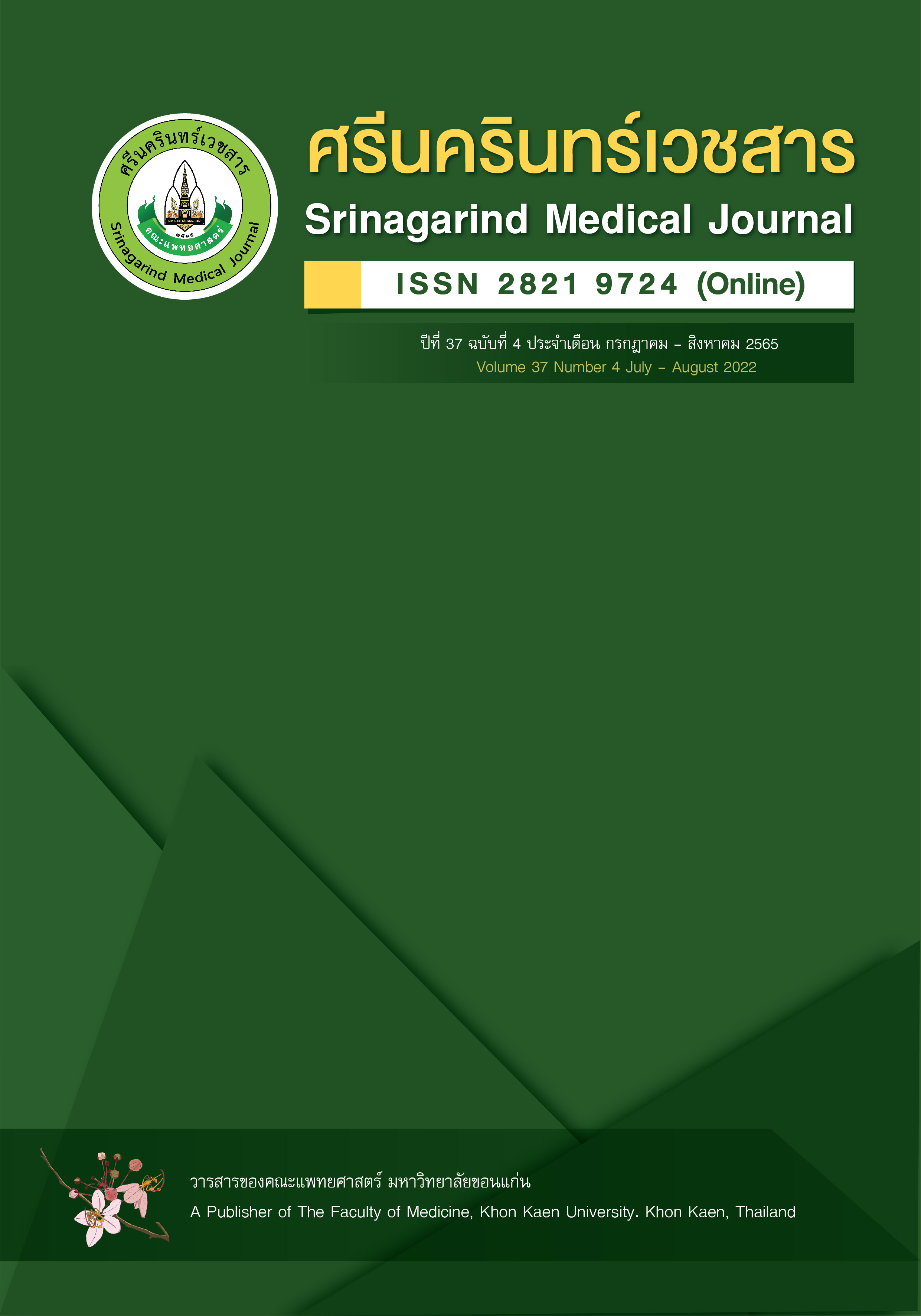การพัฒนาระบบบริหารจัดการเครือข่ายบริการปฐมภูมิ ในโรงพยาบาลธวัชบุรี
Developing of Primary Health Care Network Management System in Thawat Buri Hospital
Abstract
หลักการและวัตถุประสงค์: การบริหารจัดการเครือข่ายบริการปฐมภูมิเป็นการดำเนินงานเชิงรุก เน้นการสร้างสุขภาพของบุคคล ครอบครัว และชุมชน ลดการเจ็บป่วย และลดความแออัดของผู้ป่วยที่เข้ามารับบริการในโรงพยาบาลแม่ข่าย ดังนั้น การศึกษานี้จึงมีวัตถุประสงค์เพื่อพัฒนาและประเมินผลระบบบริหารจัดการเครือข่ายบริการปฐมภูมิโรงพยาบาลธวัชบุรี
วิธีการศึกษา: เป็นการศึกษาเชิงปฏิบัติการแบบมีส่วนร่วม การดำเนินการศึกษาแบ่งเป็นการวิเคราะห์ปัญหาและความต้องการและพัฒนาระบบบริหารจัดการเครือข่ายบริการปฐมภูมิ ผู้ร่วมวิจัยประกอบด้วยทีมสหสาขาวิชาชีพ 10 ราย เจ้าหน้าที่สำนักงานสาธารณสุขอำเภอ และโรงพยาบาลส่งเสริมสุขภาพตำบล 20 ราย และผู้รับบริการ 830 ราย ซึ่งได้มาจากการเลือกแบบเจาะจง (purposive sampling) เก็บรวบรวบข้อมูลโดยใช้แบบสำรวจความต้องการ แบบบันทึกผลการปฏิบัติงาน แบบสำรวจความพึงพอใจของผู้รับบริการ และแนวคำถามสำหรับการการสนทนากลุ่ม ดำเนินการศึกษาตั้งแต่เดือนตุลาคม 2563 ถึงกันยายน 2564 และวิเคราะห์ข้อมูลโดยการใช้สถิติเชิงพรรณนา และการวิเคราะห์เชิงเนื้อหา
ผลการศึกษา: ก่อนการพัฒนาพบว่า ปัญหาการจัดบริการเกิดขึ้นทั้งผู้ให้บริการ และผู้รับบริการ เช่น การเดินทาง ขั้นตอนการรับบริการ ระยะเวลารอคอย ระบบการนัดและติดตาม และความแออัดของหน่วยบริการ และค่าใช้จ่ายในการเดินทาง ตามลำดับ หลังจากการพัฒนาระบบพบว่า ผู้ป่วยเบาหวานและความดันโลหิตสูงมารับบริการที่เครือข่ายบริการทั้ง 4 จุด เพิ่มขึ้น (ร้อยละ 80.59 และ 70.66) ผู้ป่วยเบาหวานสามารถควบคุมระดับน้ำตาลในเลือดได้ hemoglobin A1c (น้อยกว่าหรือเท่ากับร้อยละ 7) โดยรวมเพิ่มขึ้น (ร้อยละ 30.14) และผู้ป่วยโรคความดันโลหิตสามารถควบคุมระดับความดันโลหิตได้ (BP<140/90 mmHg) โดยรวมเพิ่มขึ้น (ร้อยละ 69.40) ภาวะแทรกซ้อนทางไตลดลง (ร้อยละ 5.61) ภาวะแทรกซ้อนทางตาลดลง (ร้อยละ 11.11) และภาวะแทรกซ้อนทางเท้าลดลง (ร้อยละ 44.67) ระยะเวลารอคอยที่แผนกผู้ป่วยนอกโรงพยาบาลธวัชบุรี โดยรวมลดลง 1 ชั่วโมง 3 นาที ลดความแออัดในแผนกผู้ป่วยนอกโดยมีผู้ป่วยโรคเรื้อรังมารับบริการลดลง 2,694 ครั้ง มูลค่ายาและเวชภัณฑ์ทางการแพทย์ลดลง 148,081.85 บาท และผู้รับบริการมีความพึงพอใจโดยรวม คิดเป็นร้อยละ 83.2
สรุป: รูปแบบการบริหารจัดการเครือข่ายบริการปฐมภูมิส่งผลต่อผลลัพธ์ทางคลินิกของผู้ป่วยโรคเรื้อรัง ระยะเวลารอคอย มูลค่ายาและเวชภัณฑ์ทางการแพทย์ และจำนวนผู้รับบริการที่โรงพยาบาลแม่ข่าย
คำสำคัญ: ระบบบริหารจัดการ; เครือข่ายบริการปฐมภูมิ
Background and objective: Primary health care network management system is a proactive operation. Emphasis is placed on improving the health of individuals, families and communities, reduce the waiting time and reduce crowding of secondary hospitals. This study aimed to participatory action research to develop and evaluate the management system of Thawat Buri hospital primary care network.
Methods: This research was conducted a participatory action research. Conducting a situational analysis phased research and develop a management system for primary care networks were implement stages. The research participants consisted of 10 multidisciplinary team, 20 of health workers in district health promoting hospital, and 830 of service recipients derived from purposive sampling. Data collect for using were need assessment form, performance record form, and patient’s satisfaction form , group discussions, The study was conducted from October 2020 to September 2021 and analysis of data on descriptive statistics and content analysis.
Results: Before development found Service arrangement problems occur for both service providers, and service recipients, such as distance, the process of receiving services waiting period , patient appointment, patient follow-up , overcrowding of patients and travel expenses respectively. Overall, diabetes mellitus and hypertension were come to service network were increased by 80.59% and 70.66% , in well control diabetic mellitus, overall hemoglobin A1c (≤ 7%) was increased by 30.14%, and hypertension patients were able to control blood pressure (BP<140/ 90 mmHg) by 69.40 % overall, and decreased complications of kidneys, eyes and foot by 5.61%,11.11% and 44.67% respectively. The overall waiting time at the outpatient department was reduced by 1 hour and 3 minutes, decreased chronic illness patients in the outpatient department by 2,694 visits, decreased cost of medicines and medical supplies by 148,081.85 baht and the medical service satisfaction index was 83.2%.
Conclusion: The Primary health care network management system affects a clinical outcomes of chronic disease, reduce the waiting time , overcrowding in hospitals, and medical supplies .
Keywords: network management system, primary health care


